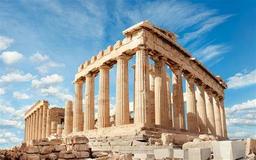
Ancient Greece
Quiz by Razvan Andrei
Feel free to use or edit a copy
includes Teacher and Student dashboards
Measure skillsfrom any curriculum
Tag the questions with any skills you have. Your dashboard will track each student's mastery of each skill.
- edit the questions
- save a copy for later
- start a class game
- automatically assign follow-up activities based on students’ scores
- assign as homework
- share a link with colleagues
- print as a bubble sheet
- Q1
What constitutes the Foundational Triad of Western Culture?
Ancient Greece, Ancient Rome, Christianity
Ancient Greece, Ancient Rome, Mesopotamia
Egypt, Mesopotamia, Ancient Greece
Ancient Rome, Mesopotamia, Egypt
300s - Q2
Three of the most influential Greek philosophers were:
Marcus Aurelius, Socrates, Plato
Socrates, Plato, Aristotle
Socrates, Diogenes, Caesar
Socrates, Hippocrates, Aristotle
300s - Q3
Herodotus is considered to be the "father" of:
History
Physics
Medicine
Mathematics
300s - Q4
The most notable difference between Sparta and Athens was:
Sparta was a great military power and diarchy, while Athens was a democracy where only adult male citizens had rights.
Sparta was a great military power and monarchy while Athens was a democracy.
Athens was democracy while Sparta was a monarchy.
Athens was a democracy because they didn't have slaves, while Sparta was a great military power and diarchy.
300s - Q5
The Stoic philosophers believed that:
Life is like a test that we can pass with the right mindset.
Life is an illusion.
Life is not worth living.
Life is meant to be enjoyed and we should have fun.
300s - Q6
The ancient Athenians:
Disagreed with slavery.
Favored citizen assemblies.
Disliked wars and fighting.
Respected women and made sure they enjoyed equal status with men.
300s - Q7
Hippocrates is considered to be the “father of”:
Mathematics
Philosophy
Medicine
History
300s - Q8
Which of the following statements about the Greco-Persian wars is true?
The Greek culture spread throughout Persia and replaced local cultures.
It can be considered a test of survival for Western civilization.
Following these wars the Greeks completely destroyed the Persian Empire.
Following these wars Sparta emerged as the ultimate political power in the Greek world.
300s - Q9
The Parthenon was:
A meeting hall for the Athenian citizen assembly.
A temple dedicated to the gods of Olympus.
A temple dedicated to the goddess Athena, which doubled as a treasury.
A temple dedicated to the gods of Sparta.
300s - Q10
The Hellenistic period begins:
After the Parthenon was built.
After the Greco-Persian wars.
After the death of Alexander the Great.
After the death of Pericles.
300s